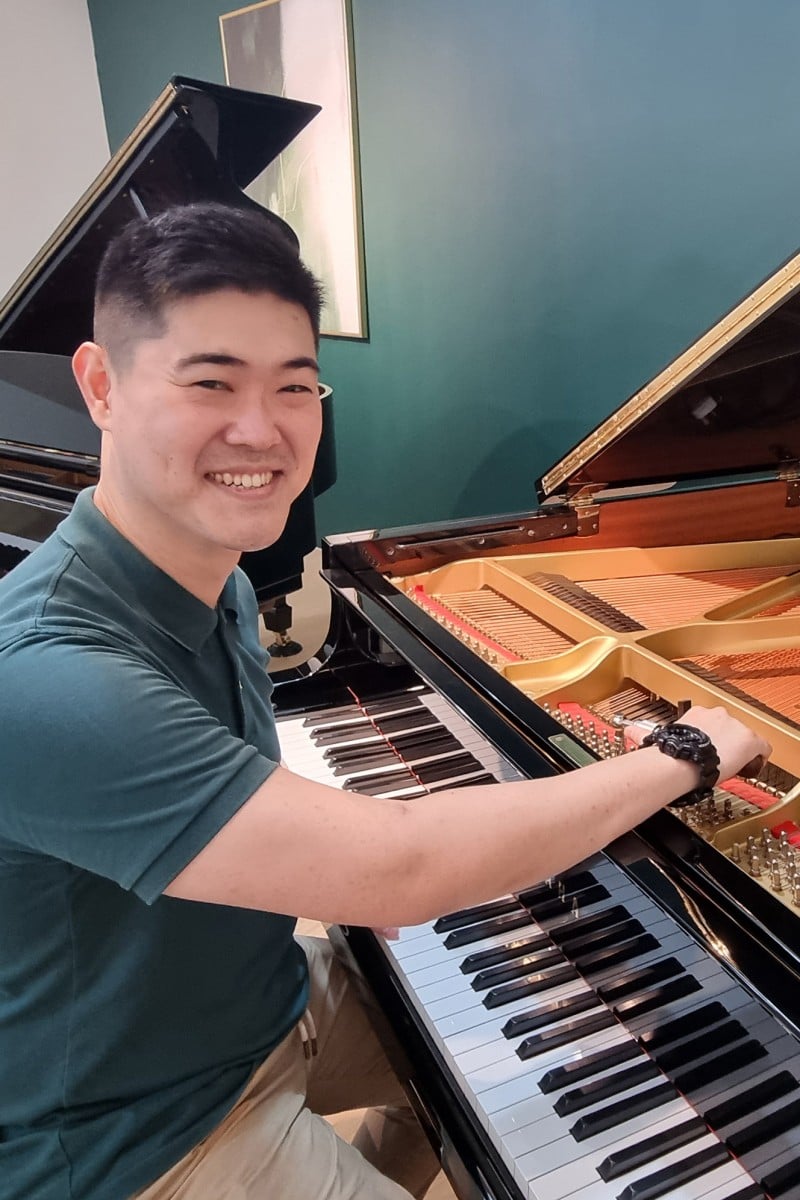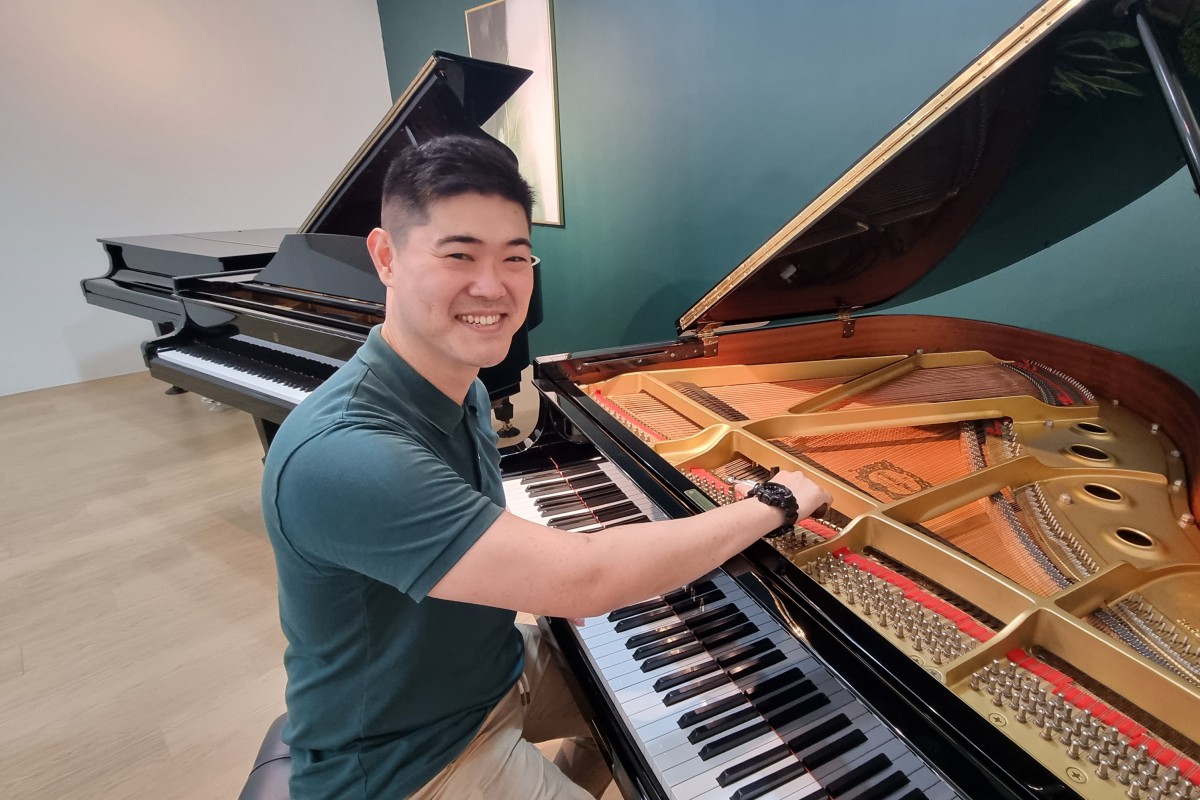
- Four years ago, Kelvin Tan left a job in accounting to restore and tune pianos – a career which requires him to ‘talk’ to instruments using skills which take years to master
- Every week, Talking Points gives you a worksheet to practise your reading comprehension with questions and exercises about the story we’ve written
 Kelvin Tan tunes pianos by playing each key and listening carefully to see which strings need to be adjusted. Photo: Music Lodge
Kelvin Tan tunes pianos by playing each key and listening carefully to see which strings need to be adjusted. Photo: Music LodgeMany of us ring in the new year by getting rid of the old and bringing in the new. But for Singaporean piano technician Kelvin Tan, nothing marks the beginning of another year better than fixing an old piano on the verge of being discarded, and bringing it back to its former glory.
Four years ago, Tan left his job in accounting to pursue a career in restoring and tuning pianos with Music Lodge, a company that specialises in second-hand pianos.
“This is a rather niche trade and [unless you have a piano at home], you’ve probably not heard of this job,” the 32-year-old said.
Teen tattoo artist on what it takes to make it in the industry
Tan added that in recent years, there were fewer piano technicians because of a lack of interest among the younger generation.
“This is not the most exciting or trendiest industry to be in. However, it does not mean my job is any less rewarding,” he said.
The piano technician shared that he had a deep sense of satisfaction whenever he revived a piano that seemed impossible to restore.
The instrument has thousands of moving parts and restoration can be a very time-consuming project. This can sometimes take up to several months and involve a complete overhaul of various elements.
Hong Kong artist on putting a lighter touch to city’s heavy news
But Tan said the effort was worthwhile especially when some of his clients shared that they hoped to pass down their pianos to the next generation.
“It always reminds me that our work behind the scenes is more than worth it,” he said.
According to Tan, it is a waste to dispose of older pianos that are damaged from wear and tear or are out of tune. Pianos can actually last a long time if they are maintained at least once a year and are well taken care of.
“It is not uncommon to see pianos that have been around for 50 or 60 years and are still functioning perfectly well,” he explained.
Hong Kong teen shares how she opened her own used book store
Apart from the satisfaction of reuniting a refurbished piano with its owner, Tan also said he found it incredibly rewarding when he helped clients understand a piano’s personality and saw them connect with one they liked.
He explained that even two pianos of the same model manufactured in the same year would not be identical. They might feel different based on the amount of pressure it takes to press a key, or sound different as each piano creates a distinct tone.
“Every piano has its own character ... [based on] how it is put together, used, treated and maintained,” Tan said.
Violin virtuoso Hannah Tam on confidence and her career
In his work, Tan also tunes pianos – a process of adjusting the tension of the piano’s strings to change their pitch. He delicately tweaks the tuning pins attached to the strings to ensure each one is in harmony with the others.
This is no simple task – each piano has more than 200 strings. He usually finishes tuning each one within an hour, spending less than 10 seconds per string on average.
For pianos that have gone significantly out of tune, this process is even more complicated. Tan said a piano’s pitch could drop so much that it would require multiple sessions to fix. Piano strings that have not been tuned regularly need extra work, as they may snap if they are not adjusted in the hands of an expert.
Hong Kong’s young ‘neon nomads’ keep dying trade flickering
“I have read that it is technically impossible to mathematically tune a piano. It is as much a science as it is art,” Tan said.
The technician added that being a good piano tuner is not just about being able to identify the correct pitch and octaves. Tuners must also have an intimate dialogue with the instrument – talking to it through playing the keys and listening to figure out which strings need tweaking.
These skills take years to perfect, so new clients often look surprised when they meet Tan for the first time.
“Often, customers tell me that when they picture a piano technician, the image that they have in their mind is that of an uncle of a certain age, and they would not have imagined a piano tuner to be so young,” he laughed, adding that he had to work hard to develop his skills.
9-year-old Dubai DJ scratches her way to fame
Tan explained wistfully that this is also something that drives his determination to keep the trade alive. Not many young people enter or stay in the profession because it can be difficult to get the training they need.
“It is not easy to find a mentor or company that is willing to train someone from scratch because of the sheer amount of time needed,” he said.
“Very often, trainees get impatient and quit halfway. [However] ... there is no short cut to what we do because it is all accumulated from experience. It can take years to hone even a small aspect of the skills required,” explained Tan, adding that after four years, he is still learning the craft.
“But at the end of the day, the joy and satisfaction ... from seeing a once-neglected piano beautifully restored is definitely worth it.”
Click here to download a printable worksheet with questions and exercises about this story. Answers are on the second page of the document.
